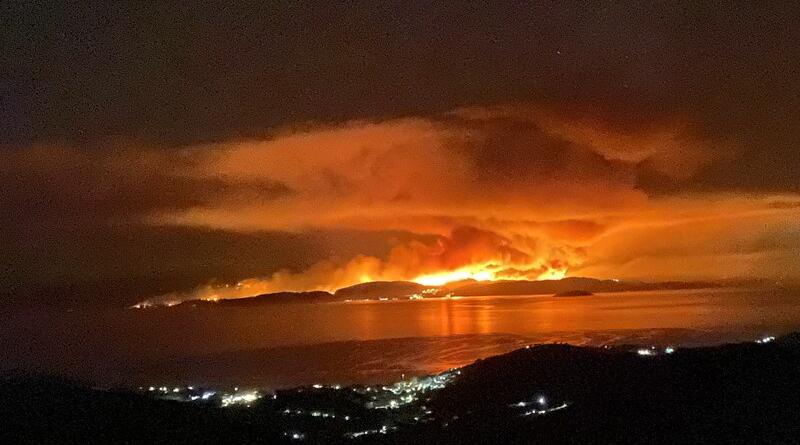The will to fight the Climate Crisis

The world this year has witnessed the hottest July on record.
The Intergovernmental Panel on Climate Change has once again highlighted the urgency to act. The damage from the climate crisis is already extensive. In Greece we suffered catastrophic fires, the worst in Europe (Greece wildfire declared largest ever recorded in EUThe Guardianhttps://www.theguardian.com › world › 2023 › aug) as well as Storm Daniel (The Guardian‘People feel unprotected’: Greeks lose faith in state after Storm Daniel and a summer of wildfires3 days ago) which destroyed a whole farming region in Thessaly, villages, livestock and many lives.
It went on to cross over the Mediterranean to wreak havoc on Libya of apocalyptic dimensions.
We mourn the lives, livestock, and nature lost to these events.
These are no longer warning signs. We are living the initial stages of permanent climate crises. Yet global greenhouse gas emissions remain at record levels. We seem unprepared both to mitigate the effects of this crisis and, more importantly, to make the necessary deep-seated changes economic, social, and cultural, to transit to sustainable development.
So it is only right that the UN Secretary-General, Antonio Guterres, decided to convene the Climate Ambition Summit in New York at the UN Headquarters these days. (https://www.un.org/en/climatechange/climate-ambition-summit)
Activists from around the globe are also here in New York to voice their demand for the show of political will. The political will from the leading figures of all here at the UN, for a green, just, and participatory transition to a sustainable society.
Beyond the necessary protests, many pose an important question. “What can be done”. The answer is that there is much that can be done, we have the technology, we can muster the resources, and we can mobilize our societies if we choose to do so.
Yet, I will stress as a first priority, the need for global and regional cooperation. The climate crisis and all that it brings is the biggest threat to humanity after the possibility of nuclear warfare. Only through cooperation can we stem its consequences. Unluckily regional conflicts, wars, such as the Russian aggression in Ukraine, global rivalries, and new tensions, such as between the USA and China, seem childish as well as dangerous as we face the common threat of global climate catastrophes.
So my advice to leaders around the world is simple: You must prioritize the common fight over climate change. And in doing so re-think conventional conflicts in the new context of this common threat.
In fact, one should see this common threat as an opportunity to embed dialogue, cooperation, and peace, so necessary for the survival of humanity. As COVID-19 very well showed us, we are all in this together.
And not to be seen as only a dreamer, (I hope I am that also), I want to give a concrete example.
It may seem a coincidence that on the same day of the Climate Ambition Summit, the two leaders of Greece and Turkey, PM. Mitsotakis and President Erdogan will be meeting here in New York. Even if climate is not on their agenda it should be.
Some years ago, as Prime Minister of Greece, I took an initiative with then Prime Minister Erdogan. On Climate.
We were able to come together, two countries seemingly historical rivals, on this issue. Not only that, we were able to establish an initiative for the whole of the Mediterranean.
We came up with a joint declaration signed by no less than 21 countries. Albania, Bulgaria, Croatia, Cyprus, Egypt, North Macedonia (then called FYROM), France, Greece, Israel, Italy, Libya, Malta, Mauritania, the Palestinian National Authority, Romania, Serbia, Slovenia, Spain, Syria, Tunisia and Turkey. The European Commission, the Arab League, the World Bank, and the Intergovernmental Panel on Climate Change (IPCC) participated in the launch.
While this initiative seemed to be forgotten as the financial crisis became worse, the Arab Spring flourished and governments changed in Greece, it is now worth revisiting.
In the end, the Mediterranean must become a region of peace and cooperation. The climate crisis demands this of us, but can also become the biggest most ambitious peace project after the establishment of the European Union.
Below is a description of the initiative as well as the Declaration itself.
Joint Declaration On the Establishment of The Mediterranean Climate Change Initiative
Today, 22 October 2010, the participants to the meeting held in Astir Palace in Athens, Greece for the launching of the Mediterranean Climate Change Initiative:
Recalling the inaugural announcement of a Mediterranean Climate Change Initiative by the Prime Minister of the Hellenic Republic at the 3rd Mediterranean Sustainable Energy Summit in Athens on 18th and 19th May 2010,
Taking into consideration that participating countries that are also member states of the EU, are committed to implement European Legislation to all policies pertaining to Climate Change,
Acknowledging that the Mediterranean region has been identified by the Intergovernmental Panel on Climate Change (IPCC) as being especially vulnerable to the impacts of climate change,
Taking into account that many of these impacts such as increased risk of drought, longer fire season, reduction in crop productivity, are common across the Mediterranean region,
Recognising that, despite the Copenhagen Accord, a legally binding international agreement on climate change remains to be secured,
Acknowledging that it is imperative that the Mediterranean presses ahead with action now, sharing best practice, experience and tools to adapt to changes already being observed and seek solutions to reduce greenhouse gas emissions,
Stating that opportunities for common low carbon development strategies in the Mediterranean should be pursued,
Noting that the Mediterranean region has an unrivalled potential to become a major hub of renewable energy generation for domestic and neighbouring markets,
Acknowledging that this potential implies increasing the technical strengths to exploit available resources and the creation of finance mechanisms as well as intensifying collaboration, including in the field of grid interconnections, which the Union for the Mediterranean (UfM) is fostering through the Mediterranean Solar Plan,
Taking into consideration that large scale renewable energy projects, the development of both climate adaptation and other mitigation solutions could bring significant new opportunities for a ‘green economic boost’ to the Mediterranean,
Noting that the potential for the creation of new local businesses and jobs arising from demand side measures in cities, buildings, transport, industry and tourism have yet to be fully explored,
Acknowledging that the emergence of a strong, action oriented Mediterranean voice would contribute to global efforts to tackle climate change through the United Nations Framework Convention on Climate Change (UNFCCC) process and will also ensure that issues relating to adaptation measures and low carbon development opportunities for the region are explored at the international level,
Hereby jointly declare the launching of a “Mediterranean Climate Change Initiative”.
The Mediterranean Climate Change Initiative will aim at contributing to the emergence of low carbon, resource efficient and climate resilient economies in the Mediterranean and its objective will be to undertake strategic policy development work on climate change adaptation and low carbon development relevant to the entire Mediterranean region. The Initiative will seek to contribute to addressing the specific challenges faced by the Mediterranean region. The Mediterranean Climate Change Initiative will aim at developing convergent Mediterranean positions on climate change demonstrating leadership and strong commitment to action in the international arena.
The participants envisage the Mediterranean Climate Change Initiative as both an autonomous Mediterranean political initiative aiming at strengthening international and regional agreements through common policy positions and concrete actions, as well as a projects-based initiative to be eligible for the UfM branding. The Mediterranean Climate Change Initiative aims to strengthen collaboration on convergent challenges and opportunities across the Mediterranean and place a greater focus on the implementation of UfM projects in the Mediterranean region. The Mediterranean Climate Change Initiative will also collaborate with other initiatives in the Mediterranean where value can be added through joint working.
The participants also state that they are equal partners in the Mediterranean Climate Change Initiative and that any other interested parties in the region can eventually be active and become equal partners in the Mediterranean Climate Change Initiative.
Photo: A picture I took of the devastating fire on the beautiful island of Evia, August 2021




